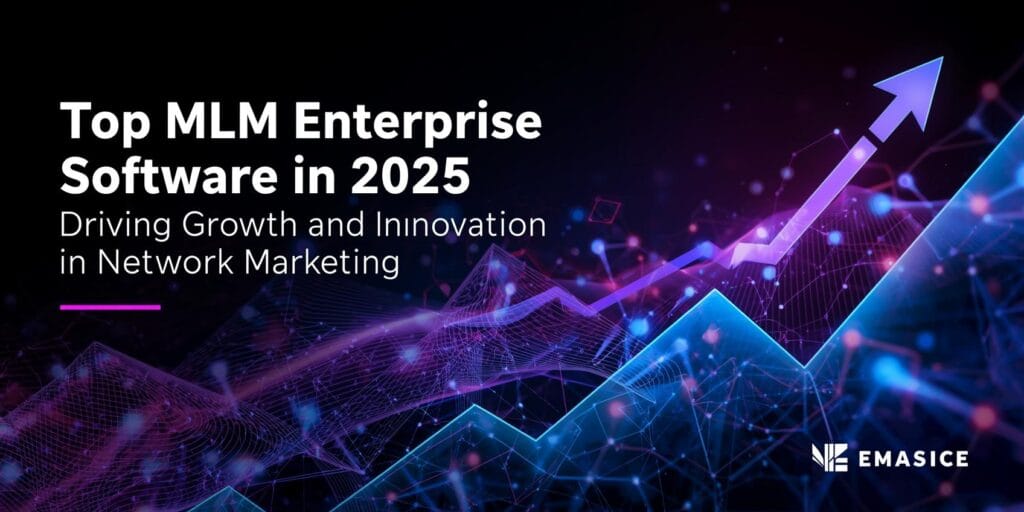MLM companies face unique challenges that standard business software can’t handle. Network marketing operations need specialized tools to manage complex compensation plans, track multi-level commissions, and support growing distributor networks across multiple markets.
This guide is designed for MLM business owners, IT decision-makers, and network marketing executives who want to choose the right enterprise software platform for sustainable growth. You’ll discover which software solutions deliver real results for large-scale operations.
We’ll explore the must-have features that separate basic MLM tools from enterprise-grade platforms. You’ll also get an inside look at the top-performing software solutions currently driving success for major network marketing companies. Finally, we’ll cover the latest technology innovations that are reshaping how MLM businesses operate and scale in today’s competitive landscape.
Essential Features That Define Leading MLM Software Platforms

Advanced Commission Calculation and Payout Systems
Modern Top MLM Enterprise Software platforms deliver sophisticated commission engines that handle complex compensation plans with surgical precision. These systems support multiple plan types including binary, matrix, unilevel, and hybrid structures, automatically calculating commissions across multiple levels and generations. The best platforms process thousands of transactions simultaneously while maintaining accuracy down to the penny, preventing costly errors that can damage distributor relationships.
Real-time commission tracking gives distributors instant visibility into their earnings, rank qualifications, and payout schedules. Advanced platforms integrate with major payment processors to support various payout methods including direct deposits, digital wallets, and international wire transfers. These systems also handle tax calculations, generate 1099 forms, and maintain detailed audit trails for compliance purposes.
Real-Time Analytics and Performance Dashboards
Enterprise-grade analytics transform raw data into actionable insights that drive Network Marketing success. Leading platforms provide customizable dashboards that display key performance indicators including sales volume, recruitment metrics, team performance, and revenue trends. Executive dashboards give leadership teams bird’s-eye views of organizational health, while field-specific analytics help distributors track their personal progress and team development.
These systems generate automated reports for various stakeholders, from detailed genealogy reports showing complete downline structures to financial summaries for accounting teams. Advanced platforms incorporate predictive analytics that identify trending products, high-performing distributors, and potential compliance issues before they become problems.
Mobile-Responsive Design for Field Representatives
Today’s network marketing happens everywhere, which means mobile optimization isn’t optional. Top-tier MLM software delivers fully responsive designs that work seamlessly across smartphones, tablets, and desktop computers. Mobile applications provide distributors with complete access to their back office functions, allowing them to enroll new customers, place orders, and check commission statements from anywhere.
Push notifications keep distributors informed about important updates, new product launches, and commission payouts. Offline capabilities ensure critical functions remain available even when internet connectivity is spotty, automatically syncing data once connection is restored.
Automated Marketing Tools and Lead Management
Sophisticated marketing automation transforms how distributors build and nurture their networks. These platforms include email marketing campaigns, social media integration, and customizable landing pages that maintain brand consistency while allowing personal touches. Lead scoring systems automatically prioritize prospects based on engagement levels and buying behaviors.
CRM functionality tracks every customer interaction, stores contact preferences, and triggers automated follow-up sequences. Integration with popular marketing tools like Facebook Ads, Google Analytics, and email platforms creates seamless workflows that convert more prospects into customers and distributors.
Market-Leading MLM Software Solutions for Enterprise Growth

Comprehensive Platform Comparison and Pricing Models
Enterprise network marketing organizations face a critical decision when selecting software platforms that can drive their business forward. The pricing structures across top MLM enterprise software solutions vary significantly, typically ranging from $500 to $5,000 per month for comprehensive enterprise packages.
Cloud-based solutions dominate the market with subscription models that scale with user volume. These platforms offer tiered pricing starting at enterprise levels with features including unlimited distributors, advanced compensation plans, and real-time analytics. On-premise solutions, while requiring higher upfront investments, provide complete data control and customization flexibility.
Key pricing considerations include setup fees, monthly licensing costs, transaction fees, and additional charges for premium features like mobile applications and advanced reporting modules. Most vendors offer customized enterprise quotes based on network size and specific feature requirements.
Platform capabilities differ substantially across providers. Some excel in compensation plan flexibility, while others prioritize user experience and mobile functionality. Enterprise buyers should evaluate total cost of ownership over 3–5 years, including implementation, training, and ongoing support expenses.
Scalability Features for Growing Networks
Network expansion demands software architecture that grows seamlessly with business growth. Modern MLM enterprise software platforms build scalability into their core infrastructure, supporting networks ranging from thousands to millions of distributors without performance degradation.
Database architecture plays a crucial role in scalability. Leading platforms use distributed database systems that can handle massive transaction volumes during peak periods like product launches or bonus payouts. Auto-scaling cloud infrastructure adjusts resources dynamically based on user demand, preventing system slowdowns during high-traffic events.
Load balancing capabilities ensure consistent performance across global networks. Top-tier platforms distribute processing loads across multiple servers, maintaining response times under 2 seconds even with concurrent user sessions in the tens of thousands. Geographic content delivery networks reduce latency for international distributors.
Storage scalability accommodates growing data volumes from user activities, sales transactions, and content libraries. Modern platforms offer virtually unlimited storage with automatic data archiving and backup systems. Some providers guarantee 99.99% uptime with redundant server configurations.
Performance monitoring tools track system health and predict scaling needs before bottlenecks occur. Automated alerts notify administrators when resources approach capacity limits, enabling proactive infrastructure adjustments.
Integration Capabilities with Existing Business Systems
Enterprise organizations rely on multiple business systems that must work together seamlessly. Top MLM enterprise software platforms offer robust integration capabilities through APIs, webhooks, and pre-built connectors that link with existing business infrastructure.
Customer Relationship Management (CRM) integration synchronizes distributor information, communication histories, and lead management across platforms. Popular integrations include Salesforce, HubSpot, and Microsoft Dynamics, enabling unified customer views and streamlined sales processes.
Enterprise Resource Planning (ERP) connections facilitate inventory management, order processing, and financial reporting. Integration with systems like SAP, Oracle, and NetSuite ensures accurate product availability, automated order fulfillment, and consolidated financial data.
Payment gateway integrations support multiple payment methods and currencies for global operations. Connections with PayPal, Stripe, and traditional merchant services enable secure transactions while maintaining PCI compliance standards.
Email marketing platform integrations automate distributor communications and promotional campaigns. Popular connections include Mailchimp, Constant Contact, and ActiveCampaign, enabling targeted messaging based on distributor performance and engagement levels.
Accounting software integration streamlines financial reporting and commission calculations. Connections with QuickBooks, Xero, and other accounting platforms ensure accurate bookkeeping and simplified tax preparation.
Custom API development enables unique integrations with proprietary systems or specialized third-party tools. Most enterprise platforms provide comprehensive API documentation and developer support for complex integration requirements.
Technology Innovations Transforming Network Marketing Operations

Artificial Intelligence for Predictive Sales Analytics
Modern MLM platforms harness AI algorithms to analyze vast datasets from distributor activities, customer behaviors, and market trends. These systems identify patterns that human analysts might miss, predicting which distributors are likely to succeed, which products will perform well in specific demographics, and when sales dips might occur.
Machine learning models continuously refine their predictions by processing real-time data from compensation plans, recruitment metrics, and product sales. Enterprise-level MLM companies use these insights to optimize training programs, adjust marketing strategies, and provide personalized coaching recommendations to their network members.
Predictive analytics also helps identify potential churn before it happens. The software analyzes engagement patterns, sales velocity, and communication frequency to flag distributors at risk of leaving the network. This early warning system enables companies to implement retention strategies proactively.
Blockchain Technology for Transparent Commission Tracking
Blockchain integration creates immutable records of all commission calculations and payments within Network Marketing operations. Every transaction, from initial sales to multi-level payouts, gets recorded on a distributed ledger that no single party can manipulate.
Smart contracts automatically execute commission payments based on predetermined rules, eliminating human error and reducing processing delays. Distributors can view their complete earning history, track bonus qualifications in real-time, and verify that calculations align with the compensation plan structure.
The transparency blockchain provides builds trust throughout the organization. Distributors gain confidence in the fairness of their compensation, while corporate administrators benefit from reduced disputes and streamlined audit processes. Some platforms even allow distributors to access their commission data through mobile apps connected to the blockchain network.
Cloud-Based Infrastructure for Global Accessibility
Cloud architecture enables MLM enterprises to scale operations across continents without maintaining physical server infrastructure in each region. Distributors access their back offices, training materials, and sales tools from any device with internet connectivity, regardless of their geographic location.
Auto-scaling capabilities handle traffic spikes during product launches or major promotional events without system crashes. The infrastructure automatically allocates additional resources when needed and scales back during quieter periods, optimizing cost efficiency.
Global content delivery networks ensure fast load times for international distributors, while multi-region data replication provides redundancy and disaster recovery capabilities. Companies can rapidly expand into new markets without the traditional IT infrastructure investments.
Social Media Integration and Digital Marketing Automation
Top MLM Enterprise Software platforms seamlessly connect with major social media networks, enabling distributors to share products and opportunities directly from their back office dashboards. Automated posting schedules maintain consistent online presence while compliance filters ensure all shared content meets company guidelines.
Lead capture systems integrate with Facebook ads, Instagram stories, and LinkedIn campaigns to funnel prospects directly into distributor pipelines. The software tracks which marketing channels generate the highest-quality leads and optimizes budget allocation accordingly.
Email marketing automation nurtures prospects through personalized sequences based on their interests and engagement levels. The system segments contacts automatically and delivers targeted content that increases conversion rates while maintaining compliance with anti-spam regulations.
Implementation Strategies for Maximum ROI and User Adoption
Best Practices for Software Migration and Data Transfer
Successful enterprise software migration requires a systematic approach that protects valuable network marketing data while minimizing business disruption. Start by conducting a comprehensive audit of your existing MLM database, identifying critical information like genealogy structures, commission histories, and member profiles that need seamless transfer.
Create a detailed migration timeline spanning 8-12 weeks, allowing adequate testing phases before full deployment. Establish a parallel system environment where both old and new platforms run simultaneously for 30-60 days, enabling real-time comparison and issue resolution.
Data mapping becomes crucial when moving between different MLM platforms. Work closely with your software provider to establish field correlations, ensuring commission calculations, rank qualifications, and bonus structures translate accurately. Consider these migration priorities:
- Member genealogy and sponsorship chains: Preserve network relationships
- Historical commission data: Maintain compensation transparency
- Product inventory and pricing: Ensure business continuity
- Payment processing integration: Avoid financial disruptions
- Custom business rules: Transfer unique compensation plans
Implement robust backup protocols throughout the migration process. Schedule transfers during low-activity periods to minimize impact on active distributors. Test critical functions like commission calculations and member portal access before announcing the transition to your network.
Training Programs for Network Representatives
Network marketing success depends heavily on distributor proficiency with your MLM platform. Develop multi-layered training programs that address different learning styles and technical comfort levels within your network organization.
Create role-specific training modules targeting distinct user groups. New distributors need basic navigation, product ordering, and team-building tools, while experienced leaders require advanced reporting features, team management capabilities, and marketing automation functions.
Design interactive training content that includes:
| Training Component | Delivery Method | Duration | Target Audience |
| Platform Basics | Video tutorials | 30 minutes | New members |
| Team Management | Live webinars | 60 minutes | Team leaders |
| Advanced Reports | Interactive demos | 45 minutes | Senior distributors |
| Mobile App Usage | Step-by-step guides | 20 minutes | All users |
Establish ongoing support systems beyond initial training. Create user forums, FAQ databases, and regular “office hours” where distributors can ask questions about platform features. Consider implementing a certification program that rewards distributors who master platform capabilities with special recognition or bonus opportunities.
Record training sessions for on-demand access, recognizing that network marketing operates across different time zones and schedules. Provide training materials in multiple languages if your network spans international markets.
Customization Options for Brand Alignment
Top MLM Enterprise Software platforms offer extensive customization capabilities that help maintain consistent brand identity throughout your network marketing organization. Focus on visual elements that create immediate brand recognition while ensuring functionality remains intuitive for all users.
Customize the distributor portal interface with your company colors, logos, and brand messaging. Most enterprise platforms allow complete theme customization, including header designs, navigation menus, and dashboard layouts that reflect your corporate identity.
Develop branded mobile applications that extend your platform’s functionality while maintaining visual consistency. Mobile customization options typically include:
- Custom app icons and splash screens
- Branded color schemes and typography
- Personalized welcome messages and onboarding flows
- Company-specific terminology and product catalogs
Configure communication templates to match your brand voice. Customize automated emails, SMS notifications, and system announcements with consistent messaging that reinforces your company culture and values. This includes welcome sequences for new distributors, commission notifications, and promotional campaign communications.
White-label capabilities allow complete platform rebranding, presenting the software as your proprietary business tool rather than a third-party solution. This approach strengthens distributor loyalty and creates a more professional experience for network members.
Consider customizing business rule configurations to match your unique compensation structure and operational requirements. Most enterprise MLM platforms accommodate complex bonus structures, qualification periods, and rank advancement criteria that align with your specific business model.
Compliance and Security Features for Regulatory Requirements
Multi-Jurisdiction Legal Compliance Tools
Today’s network marketing companies operate across multiple countries and states, each with distinct regulatory frameworks. Top MLM Enterprise Software platforms now integrate sophisticated compliance engines that automatically adapt compensation plans, marketing materials, and business practices to local requirements. These systems continuously monitor regulatory changes across jurisdictions and flag potential violations before they occur.
Advanced platforms maintain comprehensive databases of MLM regulations from major markets including the United States, European Union, Canada, and Asia-Pacific regions. They automatically generate jurisdiction-specific reports for regulatory bodies and ensure commission structures comply with local pyramid scheme prevention laws. Smart compliance modules also manage product registration requirements, ensuring all merchandise meets regional safety and labeling standards.
Data Protection and Privacy Safeguards
Modern MLM software prioritizes data security through enterprise-grade encryption protocols and privacy compliance frameworks. These systems implement GDPR, CCPA, and other regional privacy regulations automatically, managing consent collection, data retention policies, and deletion requests without manual intervention.
Multi-layered security architecture includes end-to-end encryption for all data transmissions, secure cloud storage with regular backups, and role-based access controls that limit sensitive information exposure. Advanced platforms feature real-time monitoring systems that detect unauthorized access attempts and automatically trigger security protocols. Personal data anonymization tools help companies maintain analytics capabilities while protecting individual privacy rights.
Audit Trails and Financial Reporting Capabilities
Comprehensive audit functionality creates immutable records of all system activities, from commission calculations to user access events. These detailed logs support regulatory audits and internal compliance reviews by maintaining timestamped records of every transaction, system change, and data modification.
Financial reporting modules generate standardized reports for tax authorities, regulatory bodies, and internal stakeholders. Automated reconciliation features match commission payouts with sales data, identifying discrepancies that require investigation. Real-time dashboard analytics provide executives with instant visibility into compensation plan performance, helping identify potential compliance issues before they escalate.
Anti-Fraud Detection and Prevention Systems
Sophisticated fraud detection algorithms analyze distributor behavior patterns, identifying suspicious activities like artificial recruitment spikes, unusual sales volumes, or coordinated account manipulation. Machine learning engines continuously improve detection accuracy by studying historical fraud patterns and emerging threats.
Prevention systems include duplicate account detection, IP address monitoring, and payment verification protocols that block fraudulent transactions in real-time. Automated risk scoring assigns threat levels to user activities, triggering manual reviews for high-risk behaviors while allowing legitimate business activities to proceed uninterrupted.
The MLM software landscape in 2025 offers powerful solutions that can transform how network marketing companies operate and grow. From advanced commission tracking and automated workflows to real-time analytics and mobile-first design, today’s platforms deliver the essential features that modern MLM businesses need to stay competitive. The top enterprise solutions combine these core capabilities with cutting-edge technologies like AI-powered insights, blockchain security, and cloud-based scalability to create comprehensive platforms that drive both efficiency and innovation.
Success with MLM software isn’t just about choosing the right platform – it’s about implementing it strategically with proper planning, training, and ongoing support. Companies that prioritize compliance features, invest in user adoption programs, and leverage the latest security measures position themselves for sustainable growth in an increasingly regulated environment. If you’re ready to take your network marketing operation to the next level, focus on finding a solution that balances powerful functionality with ease of use, and don’t underestimate the importance of working with a vendor who understands your specific business needs and growth goals.


